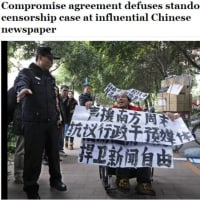--The Asahi Shimbun, July 17
EDITORIAL: Upper House should respond to public anger, doubts about security bills
(社説)法案、参院へ 怒りと疑問にこたえよ
Every day, thundering, layered chants by people of all generations and political stripes echo around the Diet building.
“Don’t decide by yourself,” they vociferate in protest against the security legislation now moving through the Diet. “Don’t make light of the people.”
「勝手に決めるな」
「国民なめるな」
世代や党派を超えた重層的な抗議のコールが連日、国会周辺の空気を震わせている。
With these cries, they are asking, “Is this really democracy?” and expressing anger about not being respected as “the people with whom sovereign power resides.”
「これが民主主義か」という疑問。「主権者は私たちだ」という怒り。
Arrogantly brushing aside the questions and anger raised by the legislation, the ruling coalition of the Liberal Democratic Party and Komeito on July 16 forced the package of national security bills through the Lower House.
それらを大いに喚起しつつ傲然(ごうぜん)と振り払い、自民、公明の与党はきのう、安全保障関連法案を衆院通過させた。
The administration of Prime Minister Shinzo Abe appears to assume that the people will eventually forget the way the legislation was rammed through the house. But the people who have sovereign power will never forget the Abe administration’s contempt for them.
強行しても「国民は忘れる」。安倍政権のこの侮りを、主権者は決して忘れないだろう。
Now, it is the Upper House’s turn to debate the legislation.
論戦の舞台は参院に移る。
The Upper House has been described, correctly or not, as “the seat of common sense” and “the chamber for reconsideration.”
「良識の府」「再考の府」。参院はまがりなりにもそう称されてきた。
In contrast to “politics of numbers” practiced at the Lower House, the Upper House is said to be the arena for “politics of reason.”
衆院の「数の政治」に対して「理の政治」。
The Upper House’s original mission is to ensure cautious and thoughtful debate at the Diet.
国会をより慎重に動かす。そんな役割を本来は担っている。
The Upper House cannot be dissolved for a snap election, and its members don’t lose their seats during their six-year terms, two years longer than those for Lower House lawmakers, who could lose their jobs before completing their terms.
This is because the Upper House is supposed to consider bills and issues from a longer and different perspective than the Lower House and adopt a multifaceted approach to dealing with them.
解散がなく、6年という長い任期が保障されているのも、衆院議員とは異なる目線と射程の長さで、ものごとを多元的に検討することが企図されている。
The system is based on the notion that conclusions and decisions reached through clashes over differing values and opinions are less likely to be misguided ones.
様々な価値観や異なる意見のせめぎ合いから導かれた結論の方が、間違いが少ないからだ。
But this important principle of pluralism has been under crushing political pressure from the Abe administration.
ところが安倍政権下、まさにその多元性が押しつぶされそうになっている。
The administration has imposed its view about the issue of Japan’s right to collective self-defense on the Cabinet Legislation Bureau, which traditionally said Japan is not allowed to exercise that right, by replacing its chief.
集団的自衛権は行使できないとしてきた内閣法制局を、人事を通じて我がものとする。
A group of the prime minister’s personal advisers, who are all his friends and allies, issued a report endorsing Japan’s exercise of its right to collective self-defense. The LDP has also made a series of moves to intimidate news media.
首相の「お仲間」で固めた私的懇談会が「行使容認」の報告書を出す。メディアを威圧しようとする自民党の動きも続く。
Simply playing ball with the Abe administration’s “politics of numbers” would be tantamount to political suicide for the Upper House because one reason for the chamber’s existence is the importance of political pluralism. Playing ball would only reinforce the lingering argument for abolishing the Upper House.
多元性の確保が存在意義のひとつである参院であればこそ、安倍政権の「数の政治」に追従すれば、自殺行為になる。くすぶる不要論にまた根拠が加わるだろう。
A long list of topics related to the security legislation need to be discussed at the Upper House.
議論すべきことは山ほどある。
For one, the government has failed to offer any convincing reply to the arguments of most constitutional scholars that the legislation is unconstitutional.
大多数の憲法学者の「違憲」の指摘に、政府は全く反論できていない。
The government has also failed to make clear in what situations Japan can engage in collective self-defense. Abe has only repeated that the decision will be based on a “comprehensive judgment.”
The administration’s attitude has only raised deep concerns among the public, leaving many people wondering whether Abe’s words mean the government should be given carte blanche to make such decisions.
どんな場合に集団的自衛権を行使できるのか、安倍首相は「総合的判断」と繰り返すばかりで、要は時の政権に白紙委任しろということかと、不安は高まる一方だ。
A wave of protests against this legislation has spread to a wide range of people, including academics, students, legal experts and independent citizens, across the nation.
Driving this growing wave of protest is a sense of urgency about the crisis that is threatening to destroy this nation’s democracy and constitutionalism. This concern is shared widely by both proponents and opponents of the legislation.
学者、学生、法曹界、無党派市民。各界各層、各地に抗議の動きが広がり続ける背景には、安保法案への賛否を超えて、この国の民主主義、立憲主義がこのままでは壊されてしまうとの危機感がある。
The members of the Diet who are discussing this legislation are lawmakers chosen through an electoral system that was declared to be in “a state of unconstitutionality” by the Supreme Court and who have been dragging their feet on rectifying the situation.
そもそも、この違憲の可能性が極めて高い法案を審議するのは、最高裁に「違憲状態」と指摘された選挙制度によって選ばれ、その是正にすらまごついている人たちなのだ。
Whom do they represent? If they want to answer this question, Upper House members should demonstrate their commitment to “politics of reason.”
あなたたちは何を代表しているのか? この問いに少しでも答えたいなら「理の政治」を打ち立てるしかない。
They should remember that the people who hold the sovereign power will be watching their actions with a watchful and suspicious eye.
主権者は注意深く、疑いの目で見ている。



















※コメント投稿者のブログIDはブログ作成者のみに通知されます